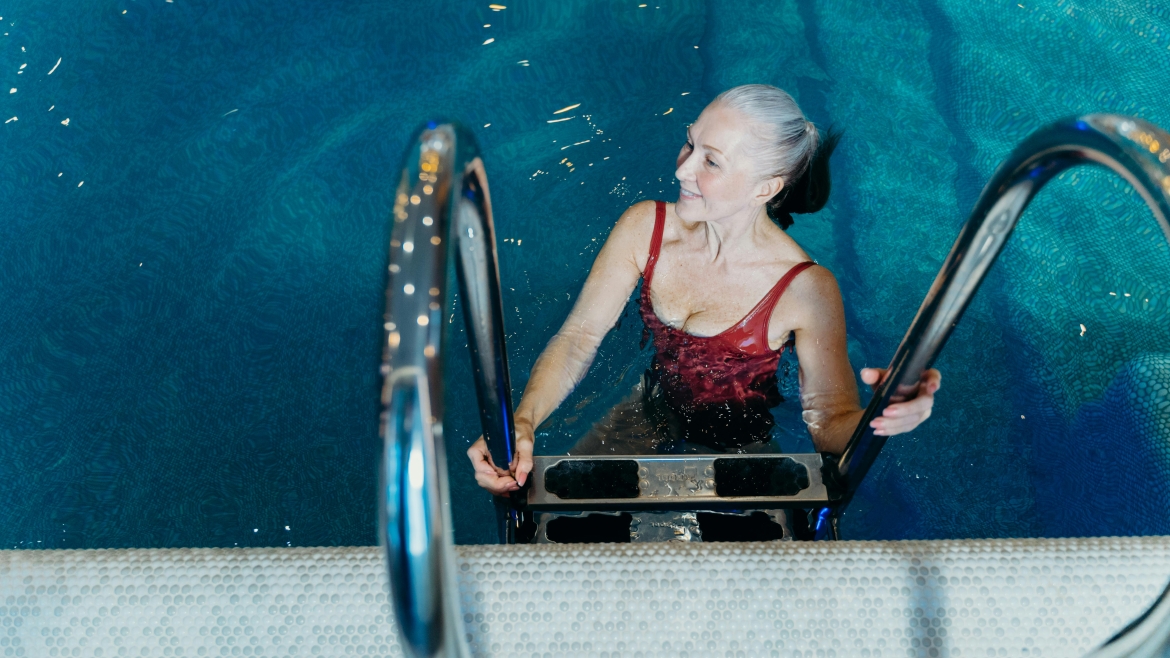Why Swimming Is Seen As A Positive For Seniors With Dementia
Water has always held a certain power—the power to calm, to heal, and to renew. For seniors living with dementia, swimming offers something far beyond exercise. It becomes a form of therapy that engages the body, stimulates the mind, and soothes the soul.
In a world that can often feel disorienting or overwhelming, the gentle embrace of water provides clarity, balance, and comfort. Swimming is not just a physical activity; it is a pathway toward emotional peace and cognitive vitality for those facing the challenges of memory loss.
The Calming Power Of Water
One of the most remarkable effects of swimming for seniors with dementia is the sense of calm it brings. Water naturally reduces stress by soothing the nervous system. The gentle resistance of each stroke requires focus and control, helping the brain shift away from confusion or agitation toward purposeful movement. The rhythmic pattern of breathing, floating, and gliding creates a meditative rhythm that helps quiet the mind and relax the body.
For many seniors, water feels like a return to safety. Its buoyancy supports their weight, relieving pressure on joints and muscles that often ache on land. This physical ease allows them to move more freely, often restoring a sense of independence that dementia can take away. The sensory experience of water—the way it feels against the skin, the sound of splashing, and the warmth of sunlight reflecting on the surface—creates an immersive environment that stimulates memory and emotion.
In that calm, seniors often rediscover fragments of themselves that dementia tries to take. They smile, laugh, and reconnect with moments of joy that feel familiar and comforting. The water, in its simplicity, becomes a bridge back to the self.
Enhancing Cognitive Function Through Movement
Beyond its emotional benefits, swimming has a profound impact on the brain. Physical activity increases blood flow, delivering oxygen and nutrients essential for cognitive health. For seniors with dementia, this stimulation can help maintain neural connections that support memory and thought. The combination of movement and coordination challenges the brain to engage multiple regions simultaneously, strengthening the pathways responsible for attention, balance, and decision-making.
Unlike other forms of exercise, swimming engages both sides of the body in synchronized motion, which enhances bilateral brain communication. This cross-body coordination activates the corpus callosum, a structure crucial for cognitive processing and mental clarity. Over time, regular swimming can help slow cognitive decline by keeping the brain active in gentle yet meaningful ways.
Additionally, swimming encourages the release of endorphins—natural mood enhancers that help combat depression and anxiety, which are common in seniors with dementia. The result is a more positive emotional state that promotes engagement and participation in daily activities. When the mind feels lighter, the heart opens, and motivation to move and connect begins to return.
Restoring Emotional Balance And Identity
Dementia does not only affect memory—it also alters emotional stability and self-perception. Many seniors struggle with frustration, fear, or confusion as their cognitive abilities change. Swimming offers a sense of purpose and accomplishment that helps rebuild self-esteem. The simple act of moving through water, guided by its natural rhythm, allows them to feel capable and free again.
For some, the water becomes a place of emotional release. The gentle immersion reduces sensory overload, allowing emotions to surface in a controlled and soothing environment. Seniors who once appeared distant or withdrawn may smile or speak more after a swim session. Caregivers often notice these moments as rare glimpses of clarity and joy—reminders that the person they love is still very much present.
The sense of identity regained in water is powerful. Swimming encourages independence without pressure, accomplishment without expectation. It transforms therapy into liberation, giving seniors the chance to rediscover dignity and self-assurance that dementia so often diminishes.
Building Connection Through Shared Experience
Swimming also strengthens the bond between seniors and their caregivers. Whether through gentle guidance in the pool or shared laughter as they move together, the experience fosters closeness and trust. The environment itself promotes safety and intimacy, free from distractions and stress. These moments of shared connection often carry over into daily life, improving communication and emotional understanding.
For caregivers, seeing their loved one calm and happy in the water provides immense relief. It restores hope and reinforces the importance of compassion in care. Swimming becomes a shared ritual—one that unites families and caregivers through the power of presence rather than words.
Beyond one-on-one care, group aquatic sessions can foster social interaction among seniors. The laughter, encouragement, and sense of community that arise in these settings help combat isolation. The water becomes not just a place of healing but a place of belonging.
A Journey Of Renewal
Swimming offers seniors with dementia something that medication alone cannot—renewal of body, mind, and spirit. The gentle movement of water reconnects them to their physical strength, awakens their cognitive awareness, and rekindles their emotional joy. Every stroke becomes a reminder that life, even when altered by dementia, can still hold beauty and meaning.
For many, the pool becomes a sanctuary, a space where confusion fades and peace returns. The act of swimming transforms from exercise into therapy, from therapy into empowerment. It reminds both seniors and their caregivers that healing does not always come from complexity—it often begins with something as simple as movement, water, and love.
In the quiet rhythm of each swim lies something profound: hope. And for seniors facing dementia, that hope—flowing as gently as the water itself—can be the greatest form of healing of all.

